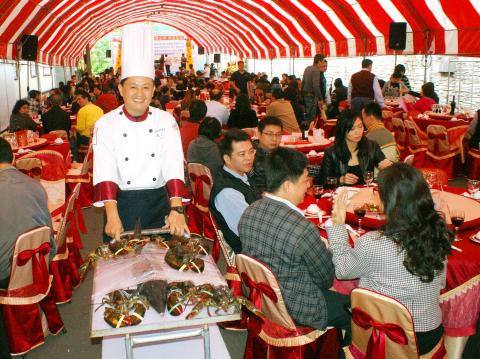The catering industry is suffering as businesses are reducing the scope of their annual banquets or simply deciding not to hold the events this year since the economy is doing so poorly. Some chefs, however, are insisting that quality not be affected and are refusing to lower prices to compete in the market, while some are creating new dishes to attract more customers and working hard to make it through these tough times.
Chi Jung-chun, a chef with Tainan’s Formosa Chefs Association, says that catering orders from various companies usually come pouring in around the time annual banquets are held, typically bringing in anywhere from 400 to 500 tables for him. This year, however, orders for not even half that many tables are being made, evidence of an economic downturn.
Chi says that a lot of companies have canceled their annual parties due to poor sales and reduced profits, handing out red envelopes filled with cash to employees instead. Although a few companies are actually seeing profits, they feel that holding an annual banquet would be too lavish and contentious in these tough times as the economy is in a slump, so they are saving money by not holding the events and giving out cash to employees instead — a major blow to the catering industry.

Photo: Wu Chun-fong, Liberty Times
照片:自由時報記者吳俊鋒
Chen Ya-chia, another chef with Tainan’s Formosa Chefs Association, says that since many companies are making less money yet would still like to hold annual banquets while also saving money at the same time, catering companies are facing the dilemma of either slashing prices to compete or choosing to continue offering quality catering.
In order to maintain the normal amount of catering orders, Lu Cheng-chih, a chef who won first prize at the World Golden Chef Competition, has teamed up with people working in other fields to enhance the performance arts aspect of his catering events, cooking up something fresh and lively for his customers. He is also giving performances while the food is being served and displays the catching of seafood during the events, highlighting the freshness of the ingredients used and improving the overall presentation of catering services, which has successfully attracted more customers and allowed his catering business not to be affected by the downturn.
(Liberty Times, Translated by Kyle Jeffcoat)
經濟差,景氣壞,廠商辦年終尾牙有的縮水、甚至停辦,外燴業者叫苦,但仍有主廚堅持品質,不願削價競爭,也有總舖師推出新菜色,爭取客源,努力捱過景氣寒冬。
台南市福爾摩沙廚藝協會的總舖師机榮俊說,以往尾牙期間,各公司行號的外燴訂單接踵而至,累計都有四、五百桌,今年卻一半還不到,顯見景氣之差。
机榮俊說,很多公司因業績衰退而取消尾牙,有的盈餘減少,僅發紅包應景,少數廠商雖然賺錢,但顧及景氣不佳的社會氛圍,擔心熱鬧辦桌太高調,引來炫富之議,將活動經費折算現金分給員工,導致外燴訂單大受衝擊。
協會另位總舖師陳亞家說,許多公司因獲利減少,想辦桌吃尾牙,卻希望壓低經費,若削價競爭,將無法兼顧餐宴,進退兩難。
在世界金廚爭霸賽獲得首獎的總舖師盧正治為了穩住尾牙業績,除與異業結盟,加強辦桌活動的綜藝表演,炒熱氣氛,更推出上菜秀,展示現撈的水產食材,凸顯料理的新鮮度,提升外燴的質感,成功吸客,今年尾牙業績影響不大。
(自由時報記者吳俊鋒)

詞法—不定詞的誤用 1. 我得記住星期五要把報告寫好。 ˇ I must remember to finish my report by Friday. χ I must remember finishing my report by Friday. 註︰remember 後面跟動名詞或不定詞表示兩種不同的概念,與 forget 相類似。 試比較下列句子: I remember meeting him somewhere.(我記得曾經在某處見過他。) I must remember to meet him at the station at six this evening. (我必須記住今晚六點得去車站接他。) He remembered turning off the light when he left the room. (他記得離開房間時曾先把燈熄了。) Remember to turn off the light when you leave the room. (記住離開房間時要把燈關了。) 2. 他提醒她做好她份內的事。 ˇ He reminded her to do her job. χ He reminded her of doing her job. 註︰remind ... of ... 後面跟動名詞,表示「使人想起做過某事」。若是「提醒某人應做某事」,應用 remind ... to do ...。試比較下列句子: He reminded me of my attending the lecture last Friday. (他讓我想起我上星期五去聽過那次演講。) He

★ Bilingual Story is a fictionalized account. 雙語故事部分內容純屬虛構。 “Any New Year’s resolutions?” he asked. Lena put her coffee down. “Yeah,” she said. “To get in shape.... round is a shape, right?” Mark chuckled. “I support this. Fully achievable. Low risk.” “Thanks,” she smiled and lovingly rubbed her round belly. “I like a resolution I can’t fail.” “Funny thing is, I was thinking about getting round too.” Lena nodded her head in approval, “You could put some meat on those skinny bones of yours.” Mark shook his head, “Not that kind of round. Wheel-of-Life round.” She raised an eyebrow.

A: Apart from Taiwan’s A-mei, Mayday and Jolin Tsai, there are many foreign singers coming to Taiwan early this year. B: The South Korean girl group Babymonster are playing two shows at Taipei Arena starting from tonight. Who else is coming to Taiwan? A: Other artists include Australian band Air Supply, K-pop superstar Rain, boy group Super Junior, TXT, US singers Giveon and Josh Groban, and Irish boy group Westlife. B: Air Supply was the first foreign band to come to Taiwan in 1983, and they’re probably the most frequently visiting group too. A: As the year is beginning

對話 Dialogue 清清:最近天氣越來越冷,感覺很容易感冒,要不要一起去吃薑母鴨或是羊肉爐? Qīngqing: Zuìjìn tiānqì yuèláiyuè lěng, gǎnjué hěn róngyì gǎnmào, yào bú yào yìqǐ qù chī jiāngmǔyā huòshì yángròulú? 華華:最近我覺得有點累,想吃薑母鴨,可是又怕一下子吃太補會上火。 Huáhua: Zuìjìn wǒ juéde yǒudiǎn lèi, xiǎng chī jiāngmǔyā, kěshì yòu pà yíxiàzi chī tài bǔ huì shànghuǒ. 清清:那我們去喝香菇雞湯吧,不太容易上火,喝了也會很暖和。 Qīngqing: Nà wǒmen qù hē xiānggū jītāng ba, bú tài róngyì shànghuǒ, hē le yě huì hěn nuǎnhuo. 華華:聽起來不錯!你們家平常冬天都吃什麼進補? Huáhua: Tīng qǐlái búcuò! Nǐmen jiā píngcháng dōngtiān dōu chī shénme jìnbǔ? 清清:我家都煮麻油雞,吃完整個人手腳都會熱起來。我也很久沒喝香菇雞湯了,正好可以去打打牙祭。 Qīngqing: Wǒ jiā dōu zhǔ máyóujī, chī wán zhěnggè rén shǒujiǎo dōu huì rè qǐlái. Wǒ yě hěn jiǔ méi hē xiānggū jītāng le, zhènghǎo kěyǐ qù dǎ dǎ yájì. 華華:可是我最近在減肥,會不會吃得太補,肉又長回來了? Huáhua: Kěshì wǒ zuìjìn zài jiǎnféi, huì bú